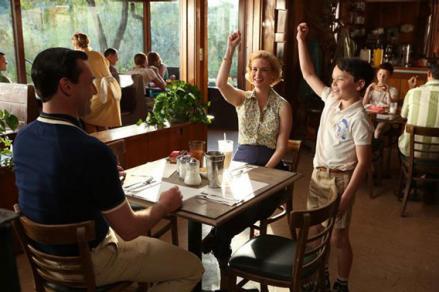Paul, Hanna,
Where you see indecision, Hanna, I see bifurcation. This episode was titled “The Better Half”—partly a reference to Betty’s appearance at Henry’s campaign event, but also a nod to all the doubling and doppelgänging going on. If last week’s episode was Freudian, this week’s was aligned with the work of his student: the duality of man, the Jungian thing.
The tipoff comes when Megan plays identical twins—she is simultaneously Corinne the dark-haired maid and Colette the blond husband-stealer. Recall Betty’s brief foray into brunettitude (seemingly resigned to her role as a plump housewife) followed by a triumphant return as a stunning blonde (with replenished sexual capital). Note that Peggy is also pushed to take sides with either fair Ted or dark Don. And of course Don hops out of blond Betty’s bed and heads straight to a balcony kiss with raven-tressed Megan.
But it’s a more internal duality—the one in our heads— that has always been the focus of Mad Men. This season’s billboard art is an illustration of a dark-suited Don encountering a light-suited Don as they pass on the street. One Don holds a briefcase, the other the hand of an unseen woman. We are all many people at once (Bobbys 1 through 5, if you will), and this season seems increasingly a chronicle of Don’s struggle to reconcile the splintered shards of himself. Can he integrate Don the unknowable, damaged lone wolf with Don the middle-aged, domesticated husband and father?
Paul, you mentioned how “remarkably unmysterious” Don appeared as he sang that camp song with Bobby. Indeed, this was Don as dork, dropping his Sphinx act to engage with the banal but lovely stuff of parenthood. At the same time, Betty used this rustic interlude to reassert her long-dormant side—not the Betty in the quilted housecoat who carps and laments, but the Betty “in those shorts” who is the center of attention, wielding potent sexuality. She is once again basking in the desire of every man she meets.
Watching Don and Betty turn each other on, circling each other with bad intentions, made me realize I’d missed the raw chemistry of Jon Hamm and January Jones. These are a pair of beautiful animals who know it, and can choose to exist together on a higher plane of heightened cool. Has there been a sultrier moment on TV this year than the one in which Don purrs, “I’m waiting for you to tell me to stop”?
And now that it’s ended, should we be impressed, bewildered, or amused by the fact that Matthew Weiner—for ages!—hid perhaps the most stunningly beautiful actress on TV beneath layers of prosthetics? Is this just more Weinerian expectation-thwarting—akin to Alfred Hitchcock killing off Janet Leigh in the first act of Psycho? Hanna, you previously upbraided Henry Francis for paying Betty “pallid compliments.” Was his panting lust in the back of that limo what you were looking for?
It occurs to me that we’ve been watching the late ’60s unfold mostly through the eyes of yuppie office workers. Not a lot of students and activists make major appearances in Mad Men. Lately, it’s been Peggy’s boyfriend Abe who’s served as the show’s progressive, countercultural voice. This week, as the other characters went on with their lives, oblivious to the upheaval in Paris and Prague, it seemed that selfless Abe died for their sins. Did you notice that once Peggy stabbed him with that impromptu spear, he was suffering both the stigmata and the torso wound of the crucified Nazarene? Consider that as Peggy’s knife plunges in, Abe shouts, “Jesus!” Abe would like to turn the other cheek to the toughs in their neighborhood, but Peggy’s got a much more Old Testament sensibility.
As for Roger: Hanna, you’re right; that seemed a bit of an overreaction to a well-meaning mistake. Seems hard to believe Roger’s grandson is now so “afraid of fur” that they’ll have to ditch the family dog. I think this is plot machination, heralding the return of Mona Sterling—I note that Roger’s daughter declared he can only see the boy when Mona is present.
How jaunty was that closing music, the Lou Johnson version of “Always Something There to Remind Me”? And it contained a message to all the better halves of these dual-minded characters: “You’ll always be a part of me.”
Do you feel my attention to business has been dilute?
Seth
